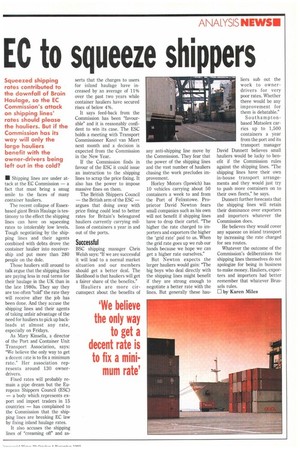EC to squeeze shippers
Page 19

If you've noticed an error in this article please click here to report it so we can fix it.
in Shipping lines are under attack at the EC Commission — a fact that must bring a smug smile to the faces of many container hauliers.
The recent collapse of Essexbased giant Brain Haulage is testimony to the effect the shipping lines can have on squeezing rates to intolerably low levels. Tough negotiating by the shipping lines and their agents combined with debts drove the container haulier into receivership and put more than 280 people on the dole.
Those hauliers still around to talk argue that the shipping lines are paying less in real terms for their haulage in the UK than in the late 1980s. They say they are too often "told" the rate they will receive after the job has been done. And they accuse the shipping lines and their agents of taking unfair advantage of the need for hauliers to pick up backloads at almost any rate, especially on Fridays.
As Mary Kinsella, a director of the Port and Container Unit Transport Association, says: "We believe the only way to get a decent rate is to fix a minimum rate." Her association represents around 130 ownerdrivers.
Fixed rates will probably remain a pipe dream but the European Shippers Council (ESC) — a body which represents export and import traders in 15 countries — has complained to the Commission that the shipping lines are breaking EC law by fixing inland haulage rates.
It also accuses the shipping lines of "creaming off" and as serts that the charges to users for inland haulage have increased by an average of 11% over the past two years while container hauliers have secured rises of below 4%.
It says feed-back from the Commission has been "favourable" and it is reasonably confident to win its case. The ESC holds a meeting with Transport Commissioner Karel van Miert next month and a decision is expected from the Commission in the New Year.
If the Commission finds in favour of the ESC it could issue an instruction to the shipping lines to scrap the price fixing. It also has the power to impose massive fines on them.
The British Shippers Council — the British arm of the ESC — argues that doing away with price fixing could lead to better rates for Britain's beleagured hauliers currently carrying millions of containers a year in and out of the ports.
Successful
BSC shipping manager Chris Welsh says: "If we are successful it will lead to a normal market situation and our members should get a better deal. The likelihood is that hauliers will get a fairer share of the benefits."
Hauliers are more circumspect about the benefits of any anti-shipping line move by the Commission. They fear that the power of the shipping lines and the vast number of hauliers chasing the work precludes improvement.
Horley Motors (Ipswich) has 10 vehicles carrying about 50 containers a week to and from the Port of Felixstowe. Proprietor David Newton fears small companies such as his own will not benefit if shipping lines have to drop their cartel. "The higher the rate charged to importers and exporters the higher the 'grid rate' paid to us. When the grid rate goes up we rub our hands because we hope we can get a higher rate ourselves."
But Newton expects the larger hauliers would gain: "The big boys who deal directly with the shipping lines might benefit if they are strong enough to negotiate a better rate with the lines. But generally these hau hers sub out the work to ownerdrivers for very poor rates. Whether there would be any improvement for them is debatable."
Southamptonbased Matsolex carries up to 1,500 containers a year from the port and its transport manager David Dunnett believes small hauliers would be lucky to benefit if the Commission rules against the shipping lines. "The shipping lines have their own in-house transport arrangements and they would just try to push more containers on to their own fleets," he says.
Dunnett further forecasts that the shipping lines will retain their dominance over exporters and importers whatever the Commission does.
He believes they would cover any squeeze on inland transport by increasing the rate charged for sea routes.
Whatever the outcome of the Commission's deliberations the shipping lines themselves do not apologize for being in business to make money. Hauliers, exporters and importers had better remember that whatever Brussels rules.
El by Karen Miles
















































































